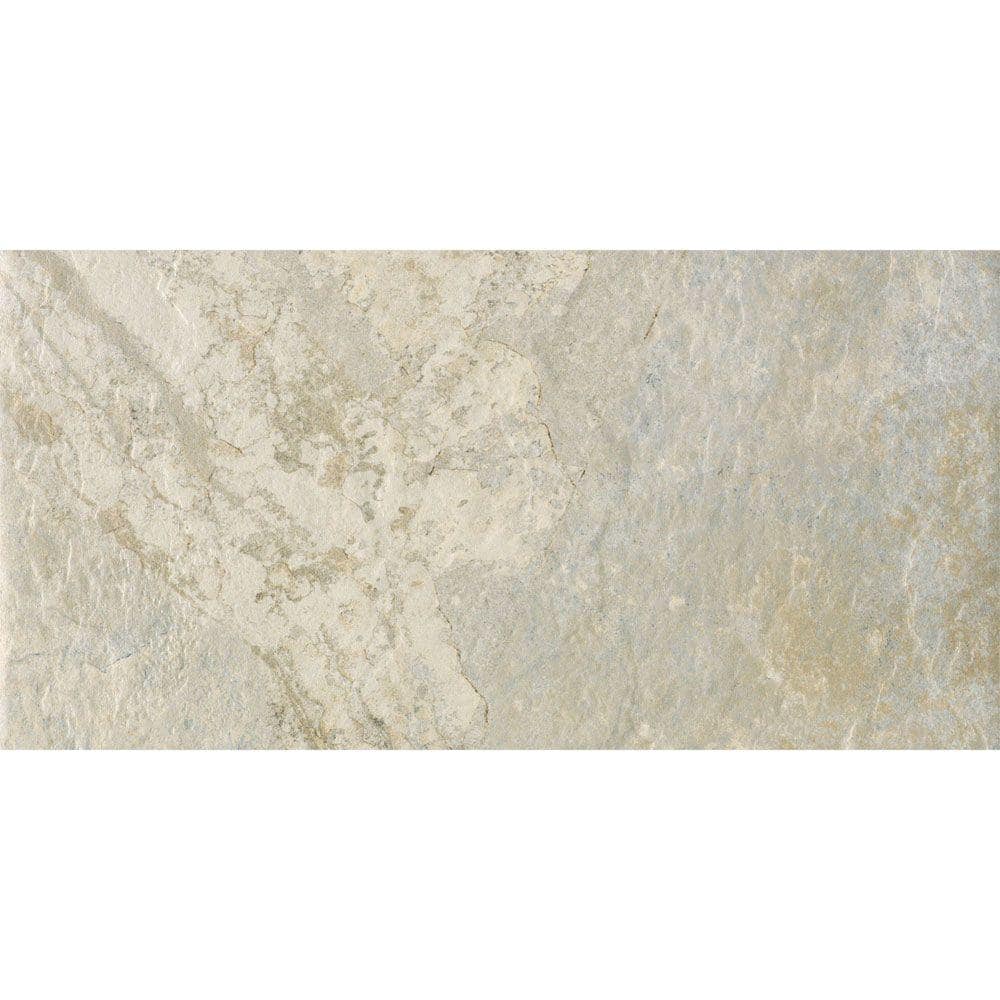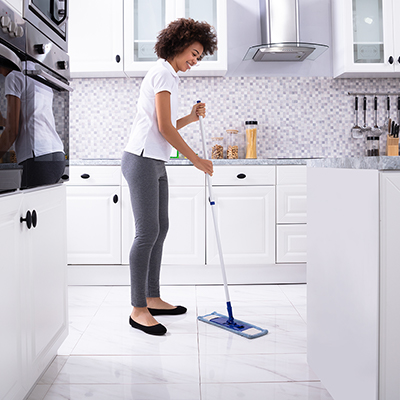Porcelain vs. Ceramic Tiles

Last updated May 16, 2025
Ceramic or porcelain tiles are two elegant and versatile types of floor tiles. These tiles can be found in kitchen and bathroom floors as well as walls and backsplashes. The popular tiles are available in colors and designs to match – or create – the decor of your room. Before picking the right style for you, understand the differences between porcelain tile and ceramic tile.
Read on to learn the pros and cons of using porcelain vs. ceramic tile for your next project.
Table of Contents
What is the Difference Between Porcelain and Ceramic Tile?
How to Tell the Difference Between Ceramic and Porcelain Tile
Benefits of Using Porcelain Tile
Disadvantages of Using Porcelain Tile
Benefits of Using Ceramic Tile
Disadvantages of Using Ceramic Tile
What is the Difference Between Porcelain and Ceramic Tile?

Ceramic tiles and porcelain tiles are similar in many ways. You can’t always tell them apart by quickly glancing at the installed products.
Both tiles are clay-based and kiln-fired, but porcelain is technically a specialized type of ceramic. The clays used to make porcelain have a higher density and are fired longer at a higher temperature than ceramic.
The difference in ingredients and production methods creates types of tile with unique characteristics. Each has its own advantages and disadvantages in the porcelain vs. ceramic tile decision.
How to Tell the Difference Between Ceramic and Porcelain Tile

Packaging will indicate if new tiles are porcelain or ceramic. The American Society for Testing and Materials (ASTM) has a certification process for manufacturers producing porcelain. For loose or installed tile, there are some rules of thumb that can help you determine whether it is ceramic or porcelain.
- Porcelain tile has the same color throughout the material. A broken or chipped piece of unglazed porcelain will have a uniform color throughout its thickness. Ceramic tile often has a glazed surface coloring, so chips may reveal a different color underneath.
- The finish of porcelain is smoother than that of ceramic. Turn over a piece of loose tile. The unglazed surface of ceramic tile will feel coarse. The finer grain of porcelain will be smooth to the touch.
- Ceramic tiles aren’t as dense as porcelain and therefore are slightly lighter by comparison.
Benefits of Using Porcelain Tile

The primary differences between porcelain and ceramic tile are composition and the manufacturing process. Porcelain is made using a mixture of finer clay packed at higher pressures and baked at higher temperatures in the kiln. This gives porcelain tile several important traits.
Pros for using porcelain tile:
- The density of porcelain tile makes it more durable than ceramic tile while being less subject to wear and tear. This makes it more suitable for commercial use as well as in the home.
- Porcelain tile is nearly impervious to water compared to ceramic tile. According to the ASTM standards, porcelain must have a water absorption rate of 0.5 percent or lower. Consider using shower porcelain tile in your bathroom remodel. Ceramic tiles are more porous and often have a higher water absorption rate.
- Outdoor porcelain tile is a good choice for patios and outdoor entertaining spaces.
- Patterned porcelain tile creates a high-end look.
- Durable and attractive kitchen porcelain tile is a smart choice for a high-traffic room that needs stain-proof and water-proof tile.
Disadvantages of Using Porcelain Tile

Porcelain tile is a desirable solution for many applications, but it does have drawbacks.
Cons for choosing porcelain tile:
- Porcelain is very strong. It requires skill using special tools to cut it.
- Porcelain is more durable than ceramic. It requires a higher upfront investment but may be more cost-effective in the long run.
Benefits of Using Ceramic Tile

Versatile ceramic tile comes in finishes ranging from simple to ornate and classic to contemporary.
Pros for using ceramic tile:
- The differences in ingredients and preparation mean that ceramic tile can be more budget friendly than porcelain tile.
- Ceramic tile is easier to cut.
- Ceramic wall tile can be customized in more colors and patterns.
- Some varieties of ceramic tiles have a textured surface that adds visual depth and dimension. You can often find tiles with ripples, waves or raised shapes.
Disadvantages of Using Ceramic Tile

Ceramic is a popular tile choice for many residential uses. However, there are other considerations.
Cons for choosing ceramic tile:
- Ceramic tile is more porous and has a higher water absorption rate. It is for indoor use only.
- Ceramic tile is not as tough as porcelain. Avoid using it in high-traffic areas.
Which is Better, Ceramic or Porcelain Tile?

When deciding on types of floor tiles, is ceramic or porcelain tile better for your project? It depends. Different types of tile are suitable for various parts of a house. The two biggest considerations are usually cost and water resistance.
- Porcelain tile is recommended for bathrooms, including floors, tub and shower surrounds and countertops.
- Porcelain is recommended for kitchens, but glazed ceramic tile is a budget-friendly option. Glazed ceramic tiles are a good choice for a kitchen backsplash.
- Ceramic tiles, both glazed and unglazed, are a good choice for walls where moisture is not a problem (like bathrooms and kitchens).
- Porcelain tile is the best choice for outdoor patios. Ceramic tiles are not durable enough for weather conditions.
Deciding between ceramic vs. porcelain tile flooring? Porcelain floor tile is harder and denser. It's useful in high-traffic areas such as kitchens, mudrooms, hallways and living areas.
Ceramic floor tiles can be more comfortable to walk on than porcelain tiles. Ceramic tile's tendency to stay cooler than porcelain makes it a popular choice for homes in warm climates.
Now that you know the pros and cons of porcelain vs. ceramic tiles, it's time to find the right types of tiles for your home. Need help identifying a tool or material? Find products fast with image search in The Home Depot Mobile App. Snap a picture of an item you like and we'll show you similar products.
If you'd rather not do it yourself, we offer professional tile installation.






























